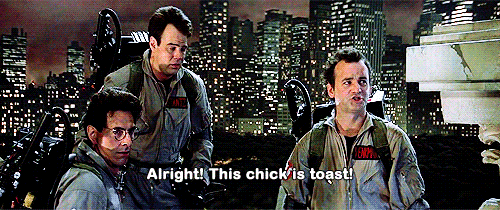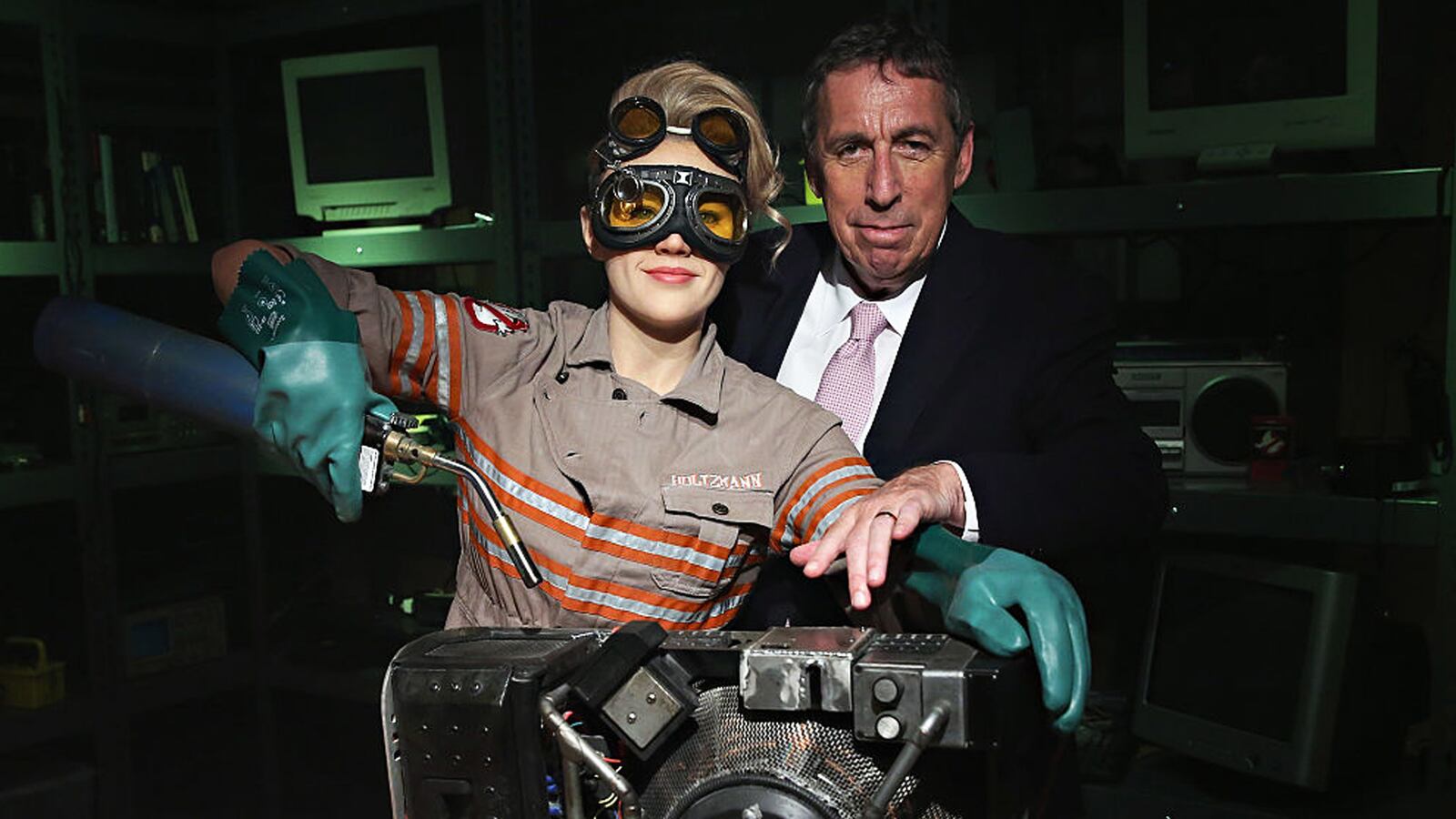Ivan Reitman spent decades entertaining the ethereal dream of getting his Ghostbusters team back together for a third film that, a few years ago, finally seemed to be on the brink of happening.
“For 20 years we did nothing because there was always one or two of us who didn’t feel like doing anything,” he told The Daily Beast on the campaign trail for Sony’s new Ghostbusters, the sci-fi comedy reboot he helped guide as producer. “It’s like a rock group: one of them doesn’t want to go on tour, they don’t go on tour.”
But just when Columbia signed off on a script for Ghostbusters III, a threequel that would reunite stars Harold Ramis, Dan Aykroyd, Ernie Hudson, and Bill Murray as mentors to a new squad of young ‘busters, Ramis died at the age of 69. The world mourned the loss of a comedy icon, and even President Obama name-dropped Ghostbusters in a statement on his passing.
“Just after they green-lit the movie he died, and boy, that just knocked the crap out of all of us,” Reitman remembered. “I knew that there was no way to do this movie. I wasn’t going to direct another Ghostbusters without Harold and god knows with Bill what kind of rock that was to push up a hill.”
The original 1984 Ghostbusters was a massive hit whose $242 million domestic lifetime gross is still the most profitable and arguably beloved film of Reitman’s career. Now, 32 years after directing Ghostbusters and its 1989 sequel, Ghostbusters II, Reitman finds himself the steward of the franchise’s future—heading Ghost Corps. to steer the IP, along with Aykroyd—even as he hands the baton to other helmers like Paul Feig.
He has high praise for Feig and the new Ghostbusters who stepped up to strap on the proton packs from the ranks of comedy hits like Bridesmaids and The Heat (Kristen Wiig and Feig muse Melissa McCarthy) and SNL (stars Kate McKinnon and Leslie Jones).
“What’s great for me is to see that Paul Feig was able to capture the spirit of the first film and has really made a film that is a lot of fun,” he said. “I think he found four extraordinary actresses who very much capture the same spirit of, you know, my Ghostbusters, in 1984. These are really talented women and their chemistry is undeniable. You want to be their friends and you wish you could hang out with them, and that’s very much the spirit of the original movie.”
The notoriously elusive Murray has a memorable cameo in the new Ghostbusters, as do Aykroyd, Hudson, Annie Potts, and Sigourney Weaver, lending their support to a reboot that’s received unprecedented scrutiny from diehard fans since it was first announced. Getting Murray to agree to show up for Feig’s Ghostbusters was reportedly much, much easier than convincing him to consider coming back for Ghostbusters III.
“It’s always difficult, with Bill in particular,” smiled Reitman, who first directed Murray in his 1979 helming debut, Meatballs, and again in 1981’s Stripes. From crashing strangers’ karaoke parties to forcing Hollywood to contact him through his lawyer, Murray’s built himself a lovably bizarre reputation that only endears him more to his adoring public. According to Reitman, that goes just as much for those who have known him for years: “Everything you’ve heard is true.”
That’s also why, in spite of their decades-long history, even he has a tough time locking Murray down. “I love the guy, I think of him as a brother, and I think he loves me,” Reitman explained. “When we’re together we can spend hours together. But then a year can go by where we don’t speak to each other, and that’s frustrating… probably more for me than it is for him.”
“But it’s the way he’s chosen to lead his life, and look—he’s this remarkable man who’s really beloved, just for those reasons. He clearly marches to his own drummer, never sells out, and really tries to lead an honest existence.”
Reitman had two discussions with Murray to get him aboard for the new Ghostbusters film, “but they were pretty easy compared to the historical conversations I’ve had with him in the first 30 years of our relationship,” he laughed. “He loved the idea of these four women doing this, and he wanted to be a supporter. I think that went a long way in him doing it.”
The first time the two men worked together, on the camp comedy Meatballs, Reitman had to quickly adjust to harnessing Murray’s talents.
“I remember him showing up the first day with the script, which he had a fair amount of disdain for. We were about to do a scene and he said, ‘This sucks,’” Reitman laughed. “I said to myself, alright, I can either push him towards doing this, or I can take advantage of one of the great comedy minds in the English language and unleash it—and I’m going to have to work more nimbly to keep up with it and make sure we’re making the same movie.”
He still considers Ghostbusters to be the best work to come from their four films together. “I like all of the movies, but I think Ghostbusters was the purest and most complex,” Reitman said. “I think he had to fit into a pretty highfalutin’ ensemble. You know, Meatballs is really a one-man show with a lot of nice kids all around him. Stripes is a two-manner but he was clearly the movie star and the alpha.”
“Here, the story was the alpha,” he continued. “It was important and you couldn’t just make up whatever was in your head. Attention had to be paid, and attention had to be paid to the storytelling. We were working as part of a group.”
Production on the original Ghostbusters was a whirlwind as soon as Columbia Pictures green-lit it for $30 million, he remembered. “We had no time! From conception to delivery in a theater it was only 13 months. I think there was something about being forced to do it so quickly that we were totally relying on our instincts, complemented by a group of actors who were really my co-writers as well. So we were all sort of creating together.”
“At the same time we had all worked together before so there was a wonderful comfort in knowing you were working with family who had your back. I mean, I could turn to Harold [Ramis] at some point and say, ‘You’ve got to give me something better than this, we’re in real trouble here.’ People were improvising and doing funny things and I was working like hell to try to contain it into something that was tonally consistent for the whole movie.”
After making Ghostbusters II, that Ghostfam scattered as everyone pursued their own projects. “Harold was directing on his own, I was directing other things, Bill wanted to do different kinds of movies, Danny was inventing the Blues Brothers and the Coneheads,” Reitman explained. But Ghostbusters III was a sequel that could only move forward if he, Aykroyd, Ramis, and Reitman could agree. “You just try to get four people to unanimously agree on anything, let alone anything as sensitive and creative and successful as what we had together,” he laughed.
Eventually the studio came to Reitman pledging a budget to develop a screenplay for the long-gestating third film, and a “passing-the-torch” sequel emerged—one that killed off Murray’s character, Dr. Peter Venkman, and turned the ghostbuster into a ghost.

“Bill—publicly, but never to me directly—said, ‘The only way I’m going to do anything like this is if I die in the first five minutes,” Reitman said. “So we killed him off in the first five minutes.”
“He became a ghost character that was really, really funny, and he plays through the whole movie of course as a ghost. It’s his son Oscar—I think it’s his son, it’s not really clear in the second movie—who is one of the new four and leads a group of men and women Ghostbusters under the tutelage of the historical Ghostbusters, and the ghost of Bill Murray.”
Wait a minute: Ivan Reitman, Godfather of Ghostbusters canon, doesn’t know if Venkman is the father of Dana Barrett’s child?
“I think he’s his son!” he smiled, shrugging. “But we never made it really clear. Who am I to ruin reputations?”
When news broke of the Feig-directed Ghostbusters reboot built around four female heroines, of course, reactionary fans revolted. Rumors of a second, estrogen-less, new Ghostbusters movie starring hot young Hollywood leading men Channing Tatum and Chris Pratt emerged as a clear counterpoint to the backlash, but Reitman scoffs at the notion that anyone took that scuttlebutt seriously.
“It was never in play! This goofy story… I never met those actors. I never had a conversation with them about Ghostbusters or anything else,” he said. “I think that initial response to having an all-girls Ghostbusters movie created this story in the press that the studio wasn’t that serious about that, because they had this secret other movie they were going to make at the same time. I mean, it doesn’t make any kind of sense at all, if you really think about it.”

What is officially in the works under Reitman’s watch is a new 2018 animated series, Ghostbusters Ecto-Force, “which is set in a futuristic environment and deals with the franchises of the Ghostbusters’ company. As we referred to in the very first movie, ‘The franchise opportunities are endless.’”
“Rich beyond our wildest dreams…!” He smiled, quoting Venkman. “I can’t remember the rest. But he was correct! And there’s much more. We have writers writing, and we’ll see. But we’ve always been very careful about every film that we’ve made—even the second one, which received in its time quite a lot of criticism when it first came out and now is looked at in a much more beloved manner.”
He’s quick to discount the rabid misconception that his original Ghostbusters was a movie meant only for dudes. “No, I think that’s crap. It started as a guy movie because the four of us were working on it together, and boom, you always write for yourself. But the sequel I was preparing, there was really no conversation about it. I always liked the idea that anyone could be a Ghostbuster. Literally millions of young girls and women who dress up and create their own costumes have been around for decades and they see it as part of their tradition as much as these guys do.”
Reitman, to his credit, doesn’t seem to share Feig’s stance on the reboot’s most aggressive internet Ghostbro trolls. “I don’t think they’re haters,” he very charitably offered. “I think they’re lovers of the first movie. It was kind of a seminal movie in their lives. Most of them saw it before the age of 10. I think they’re… protective.”
“Look, it’s wonderful that people are that committed to it and love it so much, but I think it’s silliness,” he grinned. “They should just see the movie!”






